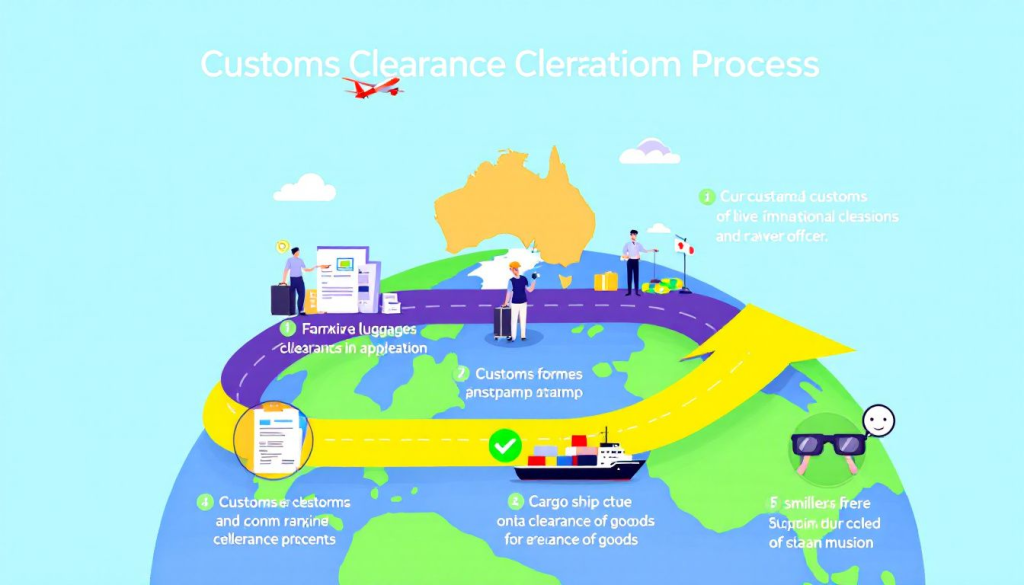Understanding the Australian Customs Clearance Process
The customs clearance process in Australia typically takes between 24-72 hours under normal circumstances. When international parcels for customs processing arrive at Australian borders, they undergo a thorough assessment by the Australian Border Force. Understanding how long customs clearance takes in Australia is crucial for businesses and individuals importing goods into the country.
Australian customs clearance involves multiple steps and requirements that can significantly impact processing times. The clearance process in Australia depends heavily on proper documentation, compliance with regulations, and the nature of imported goods.
Key Factors Influencing Clearance Times

Various elements affect the customs clearance in Australia timeframes. The value of imported goods plays a significant role, as items over AUD 1,000 require a formal import declaration N10, while those under this threshold need a self-assessed clearance SAC declaration. The country of origin documentation and applicable duties also impact processing times.
Import customs clearance can be expedited when importers understand and prepare for these requirements in advance. Working with a licensed customs broker often helps navigate the Australian customs clearance process more efficiently.
Essential Requirements for Customs Clearance
The Australian customs clearance process requires specific documentation and careful preparation. Here’s what you need to know:
Required Documentation
- Import declaration N10 (for goods over AUD 1,000)
- Bill of landing or airway bill
- Commercial invoice
- Packing list
- Certificate of origin
- Import permit (for restricted goods)
- Self-assessed clearance SAC declaration (for goods under AUD 1,000)
Processing Times by Import Type
Standard processing times for customs clearance in Australia vary by shipment type:
- Air Freight: 24-48 hours after arrival
- Sea Freight: 2-3 business days
- Express Courier: 24 hours with complete documentation
- Restricted Goods: 3-7 business days
- Goods Requiring Inspection: Up to 10 business days
Understanding Import Declarations
The types of import declarations required depend on your shipment’s value and nature:
Import Declaration N10
- Required for goods valued over AUD 1,000
- Must include detailed customs value assessment
- Needs to specify applicable tariffs duties and taxes
- Processed through integrated cargo systems
Self Assessed Clearance SAC Declaration
- For goods valued under AUD 1,000
- Available as short format SAC declaration or long format SAC declaration
- Submit SAC declarations electronically
- Requires cargo report SAC declaration details
Warehouse Declaration N20
- Used for customs-licensed warehouse storage
- Managed through integrated cargo systems ICS
- Important for temporary storage solutions
- Follows specific customs control protocols
Common Reasons for Customs Clearance Delays
Understanding why parcels get stuck in customs helps prevent delays. Here are the most frequent causes:
Documentation Issues
- Incomplete import declaration forms
- Missing or incorrect customs value information
- Insufficient product descriptions
- Incorrect tariff classifications
Compliance Matters
- Restricted goods without proper permits
- Missing certificate of origin
- Incomplete customs duties payment
- Non-compliance with Customs Act requirements
Inspection Requirements
- Random security checks
- Biosecurity concerns
- Valuation verification
- Restricted goods examination
Working with Licensed Customs Brokers
A licensed customs broker can significantly streamline your customs clearance process by:
- Managing import customs clearance documentation
- Calculating correct duties and taxes
- Liaising with the Australian Border Force
- Handling cargo report SAC declaration requirements
- Resolving customs clearance issues promptly
- Ensuring compliance with integrated cargo systems
- Expediting export customs clearance when needed
Export Customs Clearance Process
When exporting goods from Australia, specific requirements must be met:
- Submit an export declaration B957 form
- Prepare export declaration forms correctly
- Ensure compliance with export customs clearance Australia regulations
- Arrange proper documentation for international shipping
Cost Considerations
Understanding the financial aspects of customs clearance is crucial:
- Custom clearance fees and taxes vary by shipment type
- Import processing charges depend on value and category
- Duties and taxes must be paid before the release
- Applicable tariffs and duties affect total costs
- Working with a customs clearance company may incur additional fees
Best Practices for Smooth Clearance
To ensure efficient customs clearance in Australia:
Pre-Arrival Planning
- Prepare all required documentation early
- Verify restricted goods requirements
- Arrange necessary import permits
- Confirm customs value calculations
Professional Support
- Engage a licensed customs broker
- Use established customs clearance company services
- Maintain clear communication channels
- Keep documentation readily available
FAQs About Customs Clearance Times
Q: How long does customs clearance take in Australia?
A: Standard clearance typically takes 24-72 hours, though times vary based on shipment type and documentation completeness.
Q: Why is my parcel stuck in customs in Australia?
A: Common reasons include incomplete documentation, pending duties and tax payments, or required inspections for restricted goods.
Q: How long after customs clearance will I get my package?
A: Once customs clearance is completed, delivery usually takes 1-3 business days within major Australian cities.
Q: What is required for customs clearance?
A: Essential requirements include proper import declarations, payment of duties and taxes, and compliance with Australian Border Force regulations.
Final Thoughts
Successfully navigating customs clearance in Australia requires understanding the process, preparing proper documentation, and often working with experienced professionals. Whether dealing with import or export customs clearance, attention to detail and compliance with regulations ensures the most efficient processing possible.
For assistance with your customs clearance needs, consider working with a licensed customs broker who can guide you through the process and help avoid common delays.
